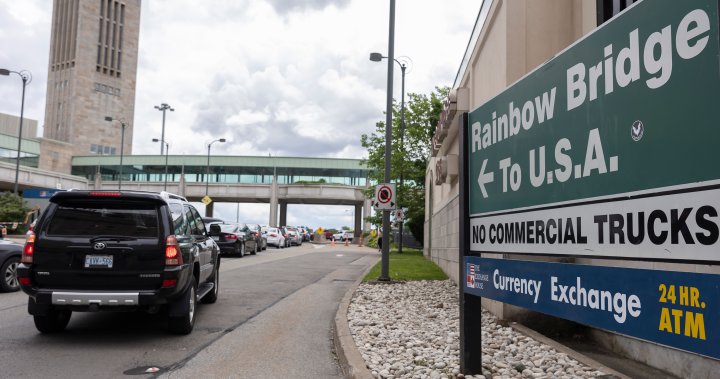Jobs
Ford to add Super Duty truck production to Canadian plant, move electric three-row SUV

A Ford Motor Co. plant in Canada will produce F-Series Super Duty trucks starting in 2026, and the Dearborn automaker will move the launch of an all-electric three-row SUV to another unspecified plant after delaying the program there.
Ford is investing $3 billion to add initial annual capacity for 100,000 F-Series Super Duty trucks at Oakville Assembly Complex in Ontario outside Toronto that ended production of the Ford Edge crossover in May. The plant will produce diesel and gas-powered trucks and will support next-generation electrified models in the future.
The expansion that will retain 1,800 jobs at the plant is in response to demand from the automaker’s profit-engine Ford Pro commercial business. Super Duty production at Kentucky Truck Assembly Plant and Ohio Assembly Plant are running at full capacity with 200,000 vehicles produced in the first half of the year, the company said. The F-Series, which includes the light-duty F-150, is the country’s top-selling nameplate.
“Super Duty is a vital tool for businesses and people around the world and, even with our Kentucky Truck Plant and Ohio Assembly Plant running flat out, we can’t meet the demand. This move benefits our customers and supercharges our Ford Pro commercial business,” Ford CEO Jim Farley said in a statement. “At the same time, we look forward to introducing three-row electric utility vehicles, leveraging our experience in three-row utility vehicles and our learnings as America’s No. 2 electric vehicle brand to deliver fantastic, profitable vehicles.”
Ford has been the only one of the Detroit Three to produce all of its full-size trucks in the United States and employs the most hourly manufacturing autoworkers in the country. The United Auto Workers last fall opted to strike Kentucky Truck, its most profitable plant that produces Super Duties and full-size SUVs, as the first full-size truck plant to be hit with a walkout. Following that, Farley earlier this year said Ford had to “think carefully about our (manufacturing) footprint.”
The expansion to Oakville, however, will allow for a staggered model-year changeover, spokesperson Jessica Enoch said. That means Super Duty production won’t be halted completely from retooling at Kentucky Truck. Ohio Assembly produces the specialized chassis cab version of the Super Duty. Oakville will be able to produce the pickup and chassis cab models.
If demand falls, U.S. plants will have prioritization on production, Enoch said. The UAW’s contract with Ford calls for a $750 million investment into Kentucky Truck that includes continued Super Duty production and new hybrid versions of the Ford Expedition and Lincoln Navigator SUVs.
Government infrastructure investments, the buildout of 5G telecommunication systems and the encouragement of domestic manufacturing have been fueling Ford Pro sales.
“There is durable demand for Super Duty from Ford Pro customers as spending on infrastructure and related construction activity remains high,” Ford Pro CEO Ted Cannis said in a statement. “Many retail customers have not been able to get their trucks fast enough because of our production constraints.”
The investment into Oakville includes $2.3 billion to install assembly and integrated stamping operations. It will secure approximately 1,800 jobs at Oakville, 400 more than initially would have been needed to produce the three-row electric SUV. It’ll also add about 150 jobs at Windsor Engine Complex to manufacture more V-8 engines.
It’ll add roughly 70 jobs and additional overtime at U.S. component plants. There will be $24 million going into Sharonville Transmission Plant in Ohio and additional overtime. Rawsonville Components Plant in Michigan will receive $1 million and roughly 20 new jobs. Sterling Axle Plant in Michigan will add about 50 new jobs.
“This investment will benefit Ford, our employees in Canada and the U.S., and especially our customers who want and need Super Duty for their lives and livelihoods,” Kumar Galhotra, Ford’s chief operating officer, said in a statement. “It is fully consistent with our Ford+ plan for profitable growth, as we take steps to maximize our global manufacturing footprint, and our investments will have a fast payback.”
Employees represented by Canadian labor union Unifor at Oakville will return a year ahead of what was expected with the delay in the three-row SUV program. Ford in April said it was postponing the launch of that vehicle to 2027 from 2025 in anticipation of better battery technology and growth in EV sales that has slowed over the past year or so.
Although Ford reported in the first half of 2024 that U.S. EV sales rose 72% and hybrids were up 50% year-over-year, it expects to lose at least $5 billion on its Model e EV division this year. The changes to planned production of the three-row electric SUV are a part of $12 billion in planned EV investment cuts and delays the company already has disclosed.
“This new retooling plan for the Oakville plant addresses our union’s concerns with Ford Motor Company’s decision to delay new vehicle production for a period that was too long, too disruptive, and too harmful to accept,” Unifor National President Lana Payne said in a statement. “Working with our local unions and company executives, we came to an agreement that will not only see our members back to work sooner, it protects our members’ jobs well into the future.”
bnoble@detroitnews.com
@BreanaCNoble










